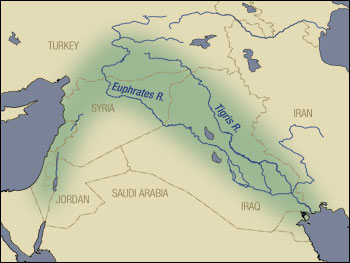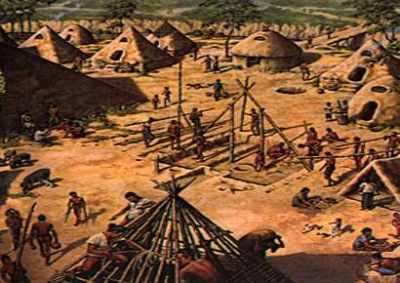
Agriculture: Boon or bane?
 About
10,000 years ago, nomadic hunter-gatherers in the Fertile Crescent
(in the modern Middle East) cultivated
wheat and became the world's first farmers. They left their
nomadic ways behind and settled down into villages, domesticating
animals and other vegetables to go along with their grain. Food
surpluses allowed the villagers to specialize, and soon their arts and
technologies exploded, giving rise to the world's first civilizations.
About
10,000 years ago, nomadic hunter-gatherers in the Fertile Crescent
(in the modern Middle East) cultivated
wheat and became the world's first farmers. They left their
nomadic ways behind and settled down into villages, domesticating
animals and other vegetables to go along with their grain. Food
surpluses allowed the villagers to specialize, and soon their arts and
technologies exploded, giving rise to the world's first civilizations.
Although a few
hunter-gatherer societies remain in remote areas, most
humans have followed these peoples' lead and created their own
agriculture-based societies. Those of us  living in agricultural
societies tend to take a manifest destiny approach to the history of
farming and civilization, considering both to be part of an inevitable
march forward
toward better times. As Roland pointed out in a comment to a
previous
lunchtime series,
agriculture is at the root of what has
allowed us the spare time to develop ipods, refrigerators, and modern
medicine.
living in agricultural
societies tend to take a manifest destiny approach to the history of
farming and civilization, considering both to be part of an inevitable
march forward
toward better times. As Roland pointed out in a comment to a
previous
lunchtime series,
agriculture is at the root of what has
allowed us the spare time to develop ipods, refrigerators, and modern
medicine.
But a closer look at the
dawn of agriculture shows that farming had at
least as many detrimental effects as beneficial ones. Is there a
seamy underbelly to the advent of farming? Can modern societies
overcome the minefield left behind by early agriculture? This
special two-week lunchtime series explores these intriguing questions.
This post is part of our History of Agriculture lunchtime series.
Read all of the entries:
|
Want more in-depth information? Browse through our books.
Or explore more posts by date or by subject.
About us: Anna Hess and Mark Hamilton spent over a decade living self-sufficiently in the mountains of Virginia before moving north to start over from scratch in the foothills of Ohio. They've experimented with permaculture, no-till gardening, trailersteading, home-based microbusinesses and much more, writing about their adventures in both blogs and books.
Want to be notified when new comments are posted on this page? Click on the RSS button after you add a comment to subscribe to the comment feed, or simply check the box beside "email replies to me" while writing your comment.

It has been amply demonstrated that humans by-and-large develop skills and technology (like agriculture) through trial and error. Only relatively recently (compared to the history of agriculture) techniques (like DOE, which you might find usefull in your experiments as well) have been developed to streamline this process.
With the benefit of knowledge and hindsight it is probably now quite easy to point out now they did things wrong back in the day w.r.t. sustainability &c.
Since it was probably agriculture that made it possible to develop this knowledge in the first place, is it fair to criticize? It's at least part a can-with-a-can-opener-inside problem.